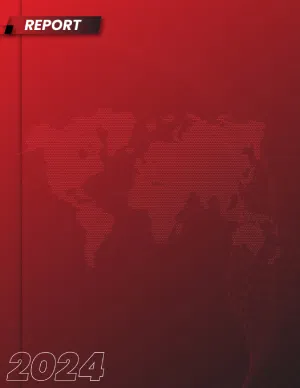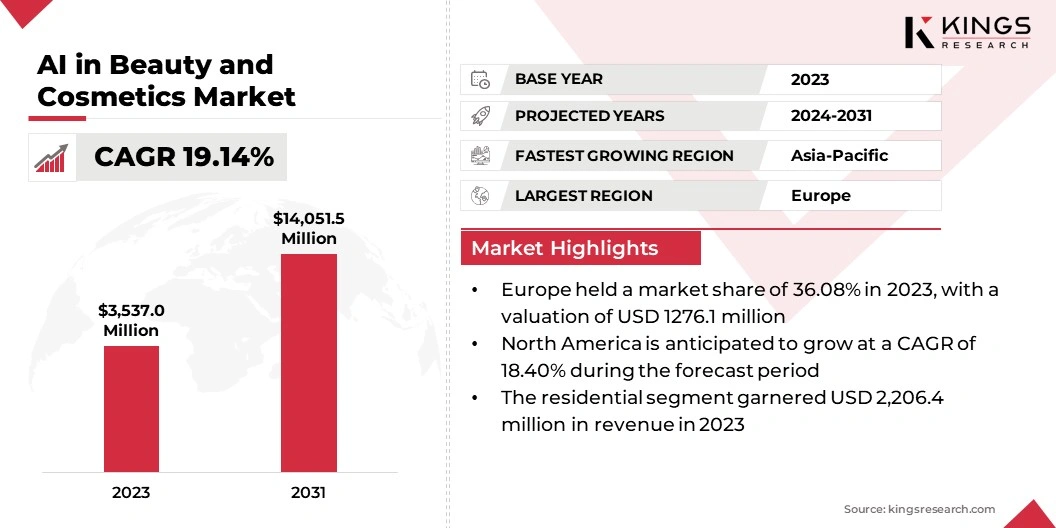Consumer Goods

AI in Beauty and Cosmetics Market

AI in Beauty and Cosmetics Market Size, Share, Growth & Industry Analysis, By Technology (Computer Vision, Machine Learning, Chatbot and virtual assistants), By Type (Skincare, Makeup, Haircare), By Application (Residential, Commercial) and Regional Analysis, 2024-2031
Pages : 120
Base Year : 2023
Release : May 2024
Report ID: KR701
AI in Beauty and Cosmetics Market Size
The Global AI in Beauty and Cosmetics Market size was valued at USD 3,537.0 million in 2023 and is projected to reach USD 14,051.5 million by 2031, growing at a CAGR of 19.14% from 2024 to 2031. The shift toward personalized regimens reflects the increasing demand for customized beauty solutions, as consumers are increasingly seeking products that address their unique concerns and deliver tangible results. In the scope of work, the report includes products offered by companies such as L’Oréal, Procter & Gamble, Shiseido Company, Limited, FOREO, MEITU, Estée Lauder Inc., Beiersdorf, Haut.AI, EveLab Insight, Inc. and Others.
Personalized beauty routines are revolutionizing the cosmetics industry by offering tailored solutions to individual skincare and beauty needs. This trend is primarily driven by advancements in AI technology, which enables companies to analyze vast amounts of datasets, including skin type, concerns, environmental factors, and genetic predispositions, to create personalized skincare routines.
By utilizing algorithms and machine learning, beauty brands recommend products and routines that are specifically suited to each customer, thereby maximizing effectiveness and customer satisfaction. As AI continues to evolve, personalized beauty regimens are poised to become even more sophisticated, offering increasingly accurate recommendations and reshaping the cosmetics landscape.
AI in beauty and cosmetics refers to the integration of artificial intelligence technologies into various aspects of the industry, encompassing product development, marketing, customer engagement, and more. These technologies leverage machine learning algorithms, natural language processing, computer vision, and data analytics to analyze vast amounts of data and extract actionable insights.
In terms of type, AI applications in beauty range from virtual try-on tools and augmented reality experiences to personalized skincare analysis and recommendation systems. These technologies enable customers to virtually test products, receive personalized recommendations, and even visualize potential outcomes before making a purchase. Furthermore, AI-powered chatbots and virtual assistants enhance customer service and engagement, providing instant support and guidance.

Analyst’s Review
The global beauty and cosmetics market is witnessing significant growth, fueled by rising disposable incomes, changing consumer preferences, and the advent of AI technology. Key players are leveraging AI to enhance customer experience through personalized recommendations, virtual try-on tools, and augmented reality applications. Strategic alliances with tech firms and investment in AI research and development are imperative to stay competitive.
Furthermore, leveraging data analytics for trend forecasting and supply chain optimization is crucial. As the market evolves, flexibility, innovation, and a customer-centric approach remain paramount for sustained growth and market leadership.
AI in Beauty and Cosmetics Market Growth Factors
The growing demand for personalized experiences and products tailored to individual needs is augmenting the market growth. This shift reflects a broader trend in consumer behavior, wherein customers are seeking authenticity, inclusivity, and sustainability from the brands they support. The rise of social media and influencer culture has led to increased consumer awareness and empowerment, prompting brands to prioritize transparency and responsiveness as key strategies. AI plays a crucial role in understanding and adapting to these evolving preferences, as it enables brands to analyze consumer data, track trends, and gather feedback in real-time.
By leveraging AI-powered tools such as sentiment analysis and social listening, companies are gaining valuable insights into consumer preferences and behaviors, allowing them to tailor their offerings and marketing strategies accordingly. Due to this, brands that prioritize consumer preferences and utilize AI to meet evolving demands are poised to gain a competitive edge in the beauty market.
Despite the numerous benefits that AI brings to the beauty and cosmetics industry, data privacy concerns remain a significant restraint. As AI-powered technologies collect and analyze vast amounts of personal data, including skin type, preferences, and even biometric information, consumers are increasingly concerned about the utilization and safeguarding of their data. This concern is further amplified by prominent instances of data breaches and incidents of misuse, which serve to erode trust in both brands and technology companies.
Moreover, the lack of standardized regulations governing data privacy in the beauty industry exacerbates these concerns, rendering consumers susceptible to potential misuse of their personal information. To mitigate this challenge, companies are focusing on data security and transparency, implementing robust measures to protect customer data and clearly communicating their data handling practices.
AI in Beauty and Cosmetics Market Trends
Augmented reality makeovers have emerged as a prominent trend in the beauty and cosmetics industry, offering consumers immersive and interactive experiences that seamlessly integrate online and offline shopping. AR technology enables users to virtually try on makeup products in real-time, allowing them to experiment with different shades, finishes, and styles before making a purchase. This trend is driven by the growing influence of digital channels in beauty shopping, as consumers are increasingly turning to online platforms and social media as primary sources for inspiration and product discovery. AR makeovers enhance the shopping experience by providing a fun and engaging way to explore new products.
Segmentation Analysis
The global AI in beauty and cosmetics market is segmented based on technology, type, application, and geography.
By Technology
Based on technology, the market is categorized into computer vision, machine learning, and chatbots and virtual assistants. The computer vision segment captured the largest market share of 42.38% in 2023, mainly propelled by its ability to revolutionize various aspects of the beauty and cosmetics industry.
Computer vision plays a crucial role in powering augmented reality (AR) makeup try-on tools, which allow consumers to virtually test different makeup products in real-time using their smart devices. This capability enhances the online shopping experience and enables advanced facial recognition features in beauty apps, facilitating personalized skincare recommendations based on individual skin concerns and characteristics. Due to these innovative applications, the computer vision segment dominated the AI-driven beauty and cosmetics market.
By Type
Based on type, the market is categorized into skincare, makeup, and haircare. The makeup segment is anticipated to witness the highest growth at a CAGR of 20.99% over the forecast period. The increasing popularity of makeup among consumers worldwide is propelled by the presence of social media influencers, celebrity endorsements, and evolving beauty trends.
Additionally, advancements in technology, particularly augmented reality (AR) and virtual try-on tools have revolutionized the process by which consumers discover, experiment with, and purchase makeup products. These digital innovations enable customers to virtually test different shades and styles of makeup, enhancing the online shopping experience and reducing the need for in-store trials.
Furthermore, the makeup segment benefits from a growing emphasis on self-expression and individuality, wherein consumers actively seek products that allow them to express their unique personalities and preferences.
By Application
Based on application, the market is bifurcated into residential and commercial. The residential segment garnered the highest revenue of USD 2,206.4 million in 2023, mainly propelled by the increasing adoption of AI-powered beauty devices and personalized skincare solutions among consumers in household settings.
With advancements in technology and the availability of affordable yet sophisticated beauty devices, consumers are increasingly integrating professional-grade skincare treatments into their daily routines. AI-powered skincare devices offer personalized recommendations and treatments tailored to individual skin concerns, such as acne, aging, and hyperpigmentation.
Additionally, the convenience and privacy provided by at-home beauty devices appeal to consumers who seek effective skincare solutions without the constraints of time or expense associated with professional treatments.
AI in Beauty and Cosmetics Market Regional Analysis
Based on region, the global AI in beauty and cosmetics market is classified into North America, Europe, Asia-Pacific, MEA, and Latin America.

The Europe AI in Beauty and Cosmetics Market share stood around 36.08% in 2023 in the global market, with a valuation of USD 1276.1 million. A significant factor supporting this considerable growth is the strong presence of established beauty brands and a highly developed retail infrastructure, providing a conducive environment for the integration of AI technologies into beauty products and services. Additionally, European consumers are known for their sophistication and discerning taste in beauty, thereby propelling the demand for innovative and personalized beauty solutions.
Furthermore, supportive regulatory frameworks and initiatives promoting sustainability and ethical practices in the beauty industry have facilitated the development and adoption of AI-driven beauty technologies. Moreover, the region's affluent consumer base and increasing digitalization have accelerated the adoption of AI-powered beauty devices and online platforms, thereby contributing to Europe's dominance in the global AI in beauty and cosmetics market.
North America is poised to experience significant growth at a CAGR of 18.40% in the foreseeable future due to the presence of a large and technologically savvy consumer base, characterized by a high level of digital literacy and enthusiasm for adopting innovative beauty solutions.
Additionally, North America boasts a robust ecosystem of technology companies, startups, and research institutions focused on developing cutting-edge AI technologies for various industries, including beauty and cosmetics. This ecosystem of innovation and entrepreneurship fosters the rapid advancement and commercialization of AI-powered beauty products and services.
Furthermore, the region's dynamic retail landscape, dominated by e-commerce giants and beauty retailers, provides ample opportunities for brands to leverage AI-driven technologies to enhance the online shopping experience and drive sales. Moreover, growing consumer awareness and rising demand for personalized beauty solutions, coupled with increasing concerns regarding data privacy and sustainability, are expected to fuel the adoption of AI in the North America AI in beauty and cosmetics market.
Competitive Landscape
The global AI in beauty and cosmetics market will provide valuable insight with an emphasis on the fragmented nature of the industry. Prominent players are focusing on several key business strategies such as partnerships, mergers and acquisitions, product innovations, and joint ventures to expand their product portfolio and increase their market shares across different regions. Manufacturers are adopting a range of strategic initiatives, including investments in R&D activities, the establishment of new manufacturing facilities, and supply chain optimization, to strengthen their market standing.
List of Key Companies in AI in Beauty and Cosmetics Market
- L’Oréal
- Procter & Gamble
- Shiseido Company, Limited
- FOREO
- MEITU
- Estée Lauder Inc.
- Beiersdorf
- Haut.AI
- EveLab Insight, Inc.
Key Industry Developments
- April 2024 (Collaboration): Estee Lauder Companies and Microsoft unveiled plans for an AI Innovation Lab to enhance their strategic alliance. Utilizing Microsoft's Azure OpenAI Service, the collaboration aims to accelerate innovation across ELC's 20+ prestige beauty brands, fostering consumer engagement and quicker market responsiveness. This initiative solidifies Estee Lauder reshaping the beauty sector through advanced generative AI technology.
The Global AI in Beauty and Cosmetics Market is Segmented as:
By Technology
- Computer Vision
- Machine Learning
- Chatbot and virtual assistants
By Type
- Skincare
- Makeup
- Haircare
By Application
- Residential
- Commercial
By Region
- North America
- U.S.
- Canada
- Mexico
- Europe
- France
- U.K.
- Spain
- Germany
- Italy
- Russia
- Rest of Europe
- Asia-Pacific
- China
- Japan
- India
- South Korea
- Rest of Asia-Pacific
- Middle East & Africa
- GCC
- North Africa
- South Africa
- Rest of Middle East & Africa
- Latin America
- Brazil
- Argentina
- Rest of Latin America
CHOOSE LICENCE TYPE
Frequently Asked Questions (FAQ's)
Get the latest!
Get actionable strategies to empower your business and market domination
- Deliver Revenue Impact
- Demand Supply Patterns
- Market Estimation
- Real-Time Insights
- Market Intelligence
- Lucrative Growth Opportunities
- Micro & Macro Economic Factors
- Futuristic Market Solutions
- Revenue-Driven Results
- Innovative Thought Leadership
.webp)